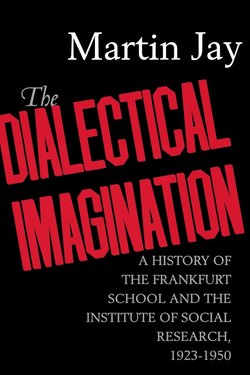Читать книгу The Dialectical Imagination - Martin Jay - Страница 7
На сайте Литреса книга снята с продажи.
ОглавлениеForeword
December, 1971
Dear Mr. Jay,
I have been asked to write a foreword to your book on the history of the Frankfurt Institute of Social Research. Reading your interesting work does not permit me to refuse this request; however, the condition of my health limits me to the short letter form, which should now serve as a foreword. First, my thanks are due you for the care which is demonstrated through all the chapters of your work. Much will be preserved which would be forgotten without your description.
The work to which the Institute devoted itself before its emigration from Germany—one thinks of Friedrich Pollock’s book The Experiments in Economic Planning in the Soviet Union, 1917–1927 or the subsequently published collective work, Authority and Family—meant something new in comparison to the then official educational system. It meant the ability to pursue research for which a university still offered no opportunity. The enterprise succeeded only because, thanks to the support of Hermann Weil and the intervention of his son, Felix, a group of men, interested in social theory and from different scholarly backgrounds, came together with the belief that formulating the negative in the epoch of transition was more meaningful than academic careers. What united them was the critical approach to existing society.
Already near the end of the twenties, certainly by the beginning of the thirties, we were convinced of the probability of a National Socialist victory, as well as of the fact that it could be met only through revolutionary actions. That it needed a world war we did not yet envisage at that time. We thought of an uprising in our own country and because of that, Marxism won its decisive meaning for our thought. After our emigration to America via Geneva, the Marxist interpretation of social events remained, to be sure, dominant, which did not mean in any way, however, that a dogmatic materialism had become the decisive theme of our position. Reflecting on political systems taught us rather that it was necessary, as Adorno has expressed it, “not to think of claims to the Absolute as certain and yet, not to deduct anything from the appeal to the emphatic concept of the truth.”
The appeal to an entirely other (ein ganz Anderes) than this world had primarily a social-philosophical impetus. It led finally to a more positive evaluation of certain metaphysical trends, because the empirical “whole is the untrue” (Adorno). The hope that earthly horror does not possess the last word is, to be sure, a non-scientific wish.
Those who were once associated with the Institute, as far as they are still alive, will certainly be thankful to you for recognizing in your book a history of their own ideas. I feel obliged also in the name of the dead, such as Fred Pollock, Theodor W. Adorno, Walter Benjamin, Franz Neumann, and Otto Kirchheimer, to express to you, dear Mr. Jay, acknowledgment and gratitude for your work.
| Cordially, MAX HORKHEIMER |
Montagnola, Switzerland
